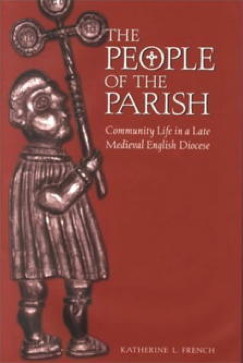 Jeg har nettopp hørt ferdig lydboka «The People of the Parish Community Life in a Late Medieval English Diocese» av Katherine L. French, der hun beskriver menighetslivet i bispedømmet Bath and Wells i England de tre siste hundreårene før reformasjonen. Der nevner hun bl.a. boka Ignorantia sacerdotum, som beskriver hva prestene må undervise menighten i minst fire ganger hvert år, på en høytidsdag. Her leser vi mer om dette:
Jeg har nettopp hørt ferdig lydboka «The People of the Parish Community Life in a Late Medieval English Diocese» av Katherine L. French, der hun beskriver menighetslivet i bispedømmet Bath and Wells i England de tre siste hundreårene før reformasjonen. Der nevner hun bl.a. boka Ignorantia sacerdotum, som beskriver hva prestene må undervise menighten i minst fire ganger hvert år, på en høytidsdag. Her leser vi mer om dette:
John Pecham’s Ignorantia sacerdotum of 1281 is quite an amazing document and offers numerous insights into medieval spirituality, the knowledge and engagement of the congregation in matters of Christian doctrine, the desire for church reform and clerical education at the highest levels in the English Church, and a rather precise definition of medieval Christian belief as delineated by the highest church official in England. Certainly a top-down picture, but inasmuch as it is a reactive, prescriptive one, it retains considerable value.
And there are linguistic issues as well. The core of Archbishop Pecham’s order is that once every quarter the parish priest “should personally explain or have someone else explain to the people in their mother tongue [my italics], without any fancifully woven subtleties, the fourteen articles of faith, the Ten Commandments of the Decalogue, the two precepts of the Gospel (namely the twin laws of charity), the seven works of mercy, the seven capital sins and their fruits, the seven principal virtues, and the seven grace-giving sacraments.” Pecham then goes on to give a summary of each of these sections.
The articles of faith reaffirm the Nicene Creed–very straightforward. Pecham’s application of the Ten Commandments, on the other hand, is extremely interesting, as the “laws of the first tablet” are all interpreted in a way to ensure the exclusive practice of the Christian religion–the old struggle against superstition and heresy. So, the first commandment “forbids all sorcery, incantations, and superstitious use of written letters or other types of images.” The second “forbids all heresy and secondarily forbids all blasphemy.” The third, the Sabbath (remembering the ecclesiastic reordering of the commandments in regards to images), “orders the promotion of the Christian religion.” The first “law of the second tablet is similarly interpreted.” Honoring one’s parents also contains “an implicit and secondary meaning” that “anyone should be honored by virtue of his status.” The rest of the commandments are more-or-less interpreted as would occur to the average person today. ….
